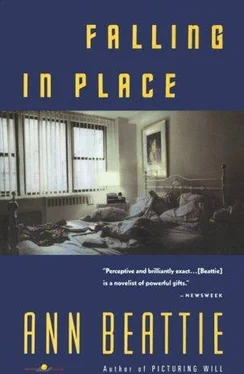Ann Beattie - Falling in Place
Здесь есть возможность читать онлайн «Ann Beattie - Falling in Place» весь текст электронной книги совершенно бесплатно (целиком полную версию без сокращений). В некоторых случаях можно слушать аудио, скачать через торрент в формате fb2 и присутствует краткое содержание. Год выпуска: 1991, Издательство: Vintage, Жанр: Современная проза, на английском языке. Описание произведения, (предисловие) а так же отзывы посетителей доступны на портале библиотеки ЛибКат.
- Название:Falling in Place
- Автор:
- Издательство:Vintage
- Жанр:
- Год:1991
- ISBN:нет данных
- Рейтинг книги:4 / 5. Голосов: 1
-
Избранное:Добавить в избранное
- Отзывы:
-
Ваша оценка:
- 80
- 1
- 2
- 3
- 4
- 5
Falling in Place: краткое содержание, описание и аннотация
Предлагаем к чтению аннотацию, описание, краткое содержание или предисловие (зависит от того, что написал сам автор книги «Falling in Place»). Если вы не нашли необходимую информацию о книге — напишите в комментариях, мы постараемся отыскать её.
Falling in Place — читать онлайн бесплатно полную книгу (весь текст) целиком
Ниже представлен текст книги, разбитый по страницам. Система сохранения места последней прочитанной страницы, позволяет с удобством читать онлайн бесплатно книгу «Falling in Place», без необходимости каждый раз заново искать на чём Вы остановились. Поставьте закладку, и сможете в любой момент перейти на страницу, на которой закончили чтение.
Интервал:
Закладка:
It was unrequited love. Again. There was romance, and then there was the real world. He did not mean the real real world, but the world that he had to work in in order to survive. He knew that the real real world was the Pentagon, not a mansion in Ojai, and he was at least thankful that he was not involved in the real real world. Trying to talk himself out of her, trying to make going away seem bearable, he had been saying to himself that she was in the real world. She worked. Was married. Separated. He had a collection of pick-up sticks; she probably had stock. And there was something about her face, however beautiful, that was not spiritual .
At the very least, he had to say goodbye. Perhaps some energy would be exchanged, perhaps some cloud of romance would hover over her until she knew that she would have to go to him. Perhaps there would be some sudden epiphany, and her heart would flutter as fast as the wings of a hummingbird, and in time that movement would carry her to him. He would let her know his friend’s number in Ojai, because he didn’t have a phone himself, and the friend’s live-in maid was always around and would know how to get in touch with him. He would like to give her something miraculous: a hummingbird wing, beating; an opal, hot with real fire. He could think of nothing but flowers. Flowers scattered in a path to her car, the essence of beauty tempering her movement into the real world. He wished that the flowers in his mother’s yard were more aromatic. Marigolds smelled sour, like some liquor. They did not feel good against your face. He would like to stroke her face with a white iris. To stroke her with flowers, different flowers for different parts of the body, the way his friend in Ojai stroked women lying naked beside his pool. A rose petal on the forehead. Tickling the bottom of her feet, gently, with a camellia. Watching through his binoculars, he had seen some goddamn fat alley cat sniff the flowers and scratch the yarn away, tugging until he had it, dragging it off only to pounce at it once and then forget it .
Time was short, and he wanted, at least, to say his goodbye. He had gotten there late, because he had had a fight with his mother, and he had not seen if she had gone into the building. But perhaps she was inside, because he had seen her husband pick up the flowers and skip up the steps with them. At least she would have his flowers .
Watching from a distance was stupid. He would go and sit on the step, and when she came home, or if she came out, he would tell her that this was goodbye, and that he adored her and wished only good things for her. He would do a trick, if she wanted him to .
He sat and waited, and finally it happened. He was sitting on the bottom step when the door opened, and she was there. She was there with her husband; and seeing him, she suddenly reached out to grab her husband’s elbow, sucking in her breath .
“Freeze,” he said, trying to be casual, to joke, to save what was meaningful for a later moment .
The gun he pointed was a red water pistol. What he shot out of it was a plastic rose .
Twenty-Three

IT WAS NOT the vacation he thought they would be having. They were in a borrowed house on the bay in Nantucket. Mary was not with them. She was at Angela’s. John Joel was still at his grandmother’s, and three times a week she and Brandt and the cook went with him into New York and waited while he talked to a psychiatrist. Louise, sitting in a chair beside the pool in the backyard, wrote them letters every day. Not post cards — letters. Post cards to Brandt. When she wrote the letters and post cards, she cupped her left hand over what she was writing, so he wouldn’t see.
She liked the pool better than the ocean. There was a chair that floated in the pool, and early in the morning when he got up, he would go to the bedroom window and peer out through the shelves of gloxinias, the purple and pink bells of flowers, and Louise would be below, with orange juice, floating in the pool. He would go downstairs and sit on the rim of the pool, his legs in the water halfway to his knees. When the sun got stronger, after an hour or so, he would push himself forward and sink down, go all the way under, exhaling, and then pop up again. Then swim. Then try to get her to go to the beach. When she wouldn’t, he would open the gate at the back of the pool and go down the fifteen steps to the sandy path, and follow it until it widened onto the beach.
Everyone had forgotten about John Joel’s braces.
Tiffy called every morning, and every evening Louise called Tiffy. Tiffy had left her husband and found an apartment on Central Park West. A famous painter whose name he had forgotten lived in the building, and Tiffy was going to take painting lessons. Tiffy this, Tiffy that. Tiffy said that Parker’s mother was in bed, trying not to have a miscarriage. Parker’s grandmother was there, taking care of things. When John had dropped Mary off at Angela’s, Angela’s father had had a lot to say about Parker’s mother. Very stupid, he said. Knew nothing about law. Parker’s father was out of town on business. The police had gone to the house several times to question Parker. Angela’s father reported that Parker’s mother had told him, with pride, what Parker said to the police: “If I told you to jump off a bridge, would you do it?”
He waded out into the water. A woman in a bikini kept throwing a plastic baseball bat into the water for a big golden retriever. He stood there, far enough away so as not to distract them, and watched the bat sail out into the water, time and again. The woman threw like a man, not like a woman. In other ways, she was obviously a woman. The bikini was cut right to the edge of her nipples, but tight, so that no matter how she moved, you couldn’t see anything.
“Isn’t he great?” the woman said, as he passed by.
“Yes. Has he always loved the water?”
“Oh yes. When he was eight weeks old, my husband waded out into a pond with him and released him, and he stayed there, perfectly still, and then he started paddling. He made it to shore and barked at my husband and threw himself in the dirt and rolled in it, but then he got tired of being mad and inched back in. We can hardly drive past water without him leaping out of the car. He’ll jump off bridges. He’s been off a diving board. He loves it.” The woman was shaking her head, beaming. The dog crouched, eyes wide, waiting for the bat. She turned and threw it. The dog was running before it had left her hand.
Parker had told his son to jump off a bridge, and he had done it.
“Isn’t that dangerous?” he said. “Can he judge what’s deep enough water to dive into?”
The woman’s expression changed. “I never thought about that,” she said. “I don’t know if he has a sense of that or not.”
He walked on, feeling like a cloud that had darkened the beach.
Every little thing that happened was getting blown out of proportion in his head. The night before, they had made shish-kebabs and cooked them on the hibachi by the pool, and he had burned his tongue, biting into a chunk of beef too soon. He had wanted to cry, to spit out the hot meat and cry. He had sucked air into his mouth instead, said nothing; but after dinner he had taken it out on her, undressing and diving into the pool, not speaking. She carried the plates into the house and didn’t come out again. From the water, he watched the coals, still glowing. Shivering in the water, he looked back at the house and saw the light on in the bedroom. The light went off. She had gone to bed at nine-thirty.
Читать дальшеИнтервал:
Закладка:
Похожие книги на «Falling in Place»
Представляем Вашему вниманию похожие книги на «Falling in Place» списком для выбора. Мы отобрали схожую по названию и смыслу литературу в надежде предоставить читателям больше вариантов отыскать новые, интересные, ещё непрочитанные произведения.
Обсуждение, отзывы о книге «Falling in Place» и просто собственные мнения читателей. Оставьте ваши комментарии, напишите, что Вы думаете о произведении, его смысле или главных героях. Укажите что конкретно понравилось, а что нет, и почему Вы так считаете.












